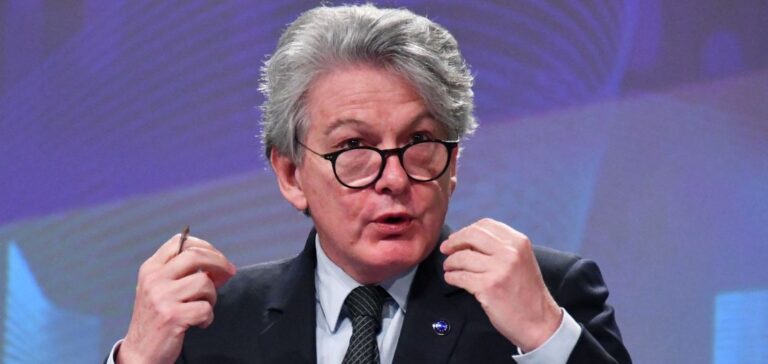The European Commissioner for the Internal Market, Thierry Breton, is calling for the creation of a “European sovereignty fund to support industrial projects” and to confront the American Inflation Reduction Act (IRA), criticized by Emmanuel Macron during his visit to the United States.
The European Union has been concerned for several months about the effects of this 420 billion dollar plan of U.S. President Joe Biden, largely devoted to the climate and adopted last summer, at the heart of an official visit by Emmanuel Macron across the Atlantic in recent days.
The plan includes reforms that favor U.S.-based companies, particularly in the electric vehicle, battery, tech, renewable energy and hydrogen sectors.
It “leads to distortions of competition at the expense of European Union companies,” said Thierry Breton in an interview with the Journal du dimanche, after threatening in early November to “go before the World Trade Organization (WTO)” to make his case.
“A working group has already been created with representatives from the White House and the European Commission,” he adds.
Emmanuel Macron said he wanted the issue of “exemptions” claimed from the United States for European industries to be “settled” by the first quarter of 2023 after having judged the day before “super aggressive” some of the American measures.
The American president said he was ready to correct the “defects” of his law, which he defended tooth and nail.
“After the overtures obtained in Washington by the president (Macron), I am confident, the efforts of the European Union will bear fruit. More quickly than we think, I hope. Perhaps in the very next few days!”, adds Mr. Breton in the JDD.
On the other hand, the Commissioner stresses the need for Europe to improve its attractiveness and competitiveness by focusing on “technology and strategic sectors for the success of its green transition”, including wind power, solar energy and electricity networks and by adapting a regulatory framework “too heavy.
Faced with the energy crisis, American competition and Chinese economic policy, he advocates “a European sovereignty fund to support industrial projects”, without forgetting the national plans “to be coordinated”.
Underlining the different debt conditions in the different countries, Thierry Breton states that “we should probably consider financing around 2% of the European Union’s GDP, or about 350 billion euros”.





















